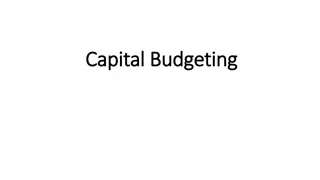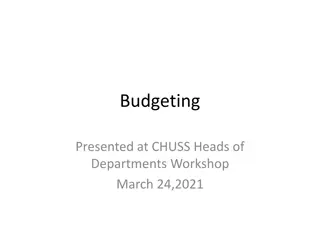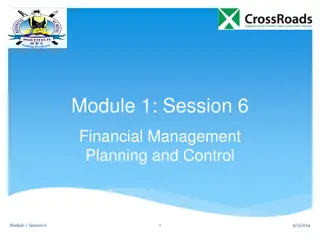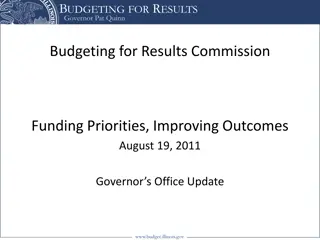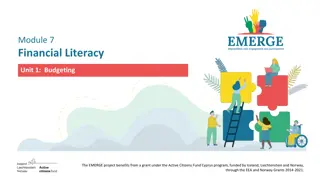
Mastering Budgeting for Financial Success
Mastering the art of budgeting is key to achieving your financial goals. Explore the importance of budgeting, how to create a budget, analyze expenses, and make necessary adjustments. Understand the bottom line of budgeting and learn practical tips to manage your finances effectively. Start your journey towards financial stability today!
Download Presentation

Please find below an Image/Link to download the presentation.
The content on the website is provided AS IS for your information and personal use only. It may not be sold, licensed, or shared on other websites without obtaining consent from the author. If you encounter any issues during the download, it is possible that the publisher has removed the file from their server.
You are allowed to download the files provided on this website for personal or commercial use, subject to the condition that they are used lawfully. All files are the property of their respective owners.
The content on the website is provided AS IS for your information and personal use only. It may not be sold, licensed, or shared on other websites without obtaining consent from the author.
E N D
Presentation Transcript
Money Matters Topic 6 Budgeting
What is a budget? A review of your monthly income and monthly expenses. You must consider all income and all expenses to be accurate.
Why Budget? It will help you achieve your financial goals. This could include retiring as early as possible, owning your own home without a mortgage, purchasing a vehicle without a loan, paying for college, providing for your family, or whatever your goals include.
Bottom Line of Budgeting If income is greater than expenses, you re building wealth. If income is less than expenses, you re building debt.
How to Budget Make a sheet to review your monthly income with your monthly expenses. Then, compare the bottom line. If you re not happy with it, make adjustments. Be realistic and make sure your budget is something with which you can reasonably live.
Make a Sample Budget Income-Monthly take-home pay $3000. This is based on an annual salary of $50,000 with a 28% tax bracket. Take-home pay is $36,000, or $3000 per month.
Expenses Monthly expenses include: Mortgage $600, Insurance $200, taxes $250, Utilities Electricity, garbage, water $200, Student Loan $125, TV-Phone-Internet $225, Credit Card payment $200, Groceries $400, Shopping $150, Car loan $300, Car Insurance $150, Gas $125, Dining out and entertainment $200.
What are the results? What do you think can be changed? What important factors are missing? What would you like to include that was not here?
Some Suggestions Think about long term goals and budget based on that. Include fun items so you are likely to follow the budget. Some recommend a 50/30/20 approach. This means 50% of take-home pay on necessities, 30% on wants, and 20% on debt payments and savings. A big key is learning to spend within your means. This means spending less than you earn. Do you need a new pair of fashion sunglasses? Do you need a sports car? Do you need a swimming pool? Or do you want them? There is a difference. There are many affordable items in life. These include hobbies, cars, homes, communities, phones, fashion items, and lifestyles.
Budgeting and Financial Goals It can help identify, plan, and carry out your financial goals. Financial goals and budgeting are closely related. To make a budget you may actually follow, you need to identify what are your financial goals. Your goals should include short-term, moderate range, and long-term plans. Financial goals should also be specific, measureable, attainable, and flexible. It helps to revisit your goals and budget frequently. Budgets and goals will change in your teens, twenties, thirties, forties, etc., and with life changes.
Goal Identification An important part of financial goal setting is prioritizing what you want in life. It may be helpful to make a list of what you want and determine what is most important to you. This could include a variety of things like a family, a sports car, a beach house, property, travel, or whatever is important to you. It is helpful to begin with needs, then consider things you want. Some financial goals include becoming self insured. Others include becoming financially independent. What do you think these mean? Some people have the goal of establishing passive income. This is income that you earn without actively working.
Connections It is important to identify your top goals and connect with ways to achieve them. If you are motivated to achieve something, you will sacrifice for it. For example, if owning a home without a mortgage is a top goal, you may be willing to sacrifice a new car and expensive travel to help achieve that goal. So, you must identify what is important to you (not your parents, siblings, or significant other).
Revisit It is valuable to revisit your financial goals and plans frequently. They will change over time. For example, your current goals may be saving for college and begin investing. After college graduation, they may be continue investing and paying off student loans. Then, they may include buying a car and a home while continuing investing. Vacations, relationships, parenthood, travel, retirement these may all be part of the plan and these things do change over time.
Considerations What is the goal of work? Make money? For what? Why? For the rest of your life? Consider the value in working until you save enough so you can enjoy your lifestyle without working. What is passive income? Bringing your own lunch vs ordering out. In his book The Automatic Millionaire, David Bach calls this the latte a day notion.


